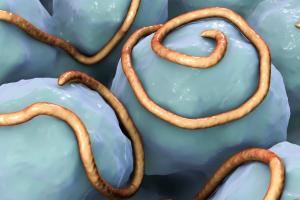Threadworms
Threadworms (pinworms) are tiny worms in your poo. They're common in children and spread easily. You can treat them without seeing your GP.
How to check for threadworms
You can spot the worms in your poo. They look like pieces of white thread.
You might also see them around your child's bottom (anus). The worms usually come out at night while your child is sleeping.

Other symptoms can include:
- extreme itching around the anus or vagina, particularly at night
- irritability and waking up during the night
Less common signs of worms include:
- weight loss
- wetting the bed
- irritated skin around the anus
A pharmacist can help with threadworms
You can get advice from your pharmacist about treatment for threadworms. You can buy medicine for threadworms from pharmacies, or get it prescribed by your GP.
This is usually a chewable tablet or liquid you swallow.
You should treat everyone in your household, even if they don't have symptoms.
Tell the pharmacist if you need to treat a child under two, or if you're pregnant or breastfeeding. Treatment might not be suitable and you may need to speak to your GP instead.
Things you should do at home
Medicine kills the threadworms, but it doesn't kill the eggs. Eggs can live for up to two weeks outside the body.
There are things you can do to stop becoming infected again.
These include:
- washing hands and scrubbing under fingernails, particularly before eating, after using the toilet or changing nappies
- encouraging children to wash hands regularly
- bathing or showering every morning
- rinsing toothbrushes before using them
- keeping fingernails short
- washing sleepwear, sheets, towels and soft toys (at normal temperature)
- disinfecting kitchen and bathroom surfaces
- vacuuming and dusting surfaces with a damp cloth
- making sure children wear underwear at night – changing it in the morning
- not shaking clothing or bedding, to prevent eggs landing on other surfaces
- not sharing towels or flannels
- not biting nails or sucking thumbs and fingers
You don't need to stay off school, nursery or work if you have threadworms.
How threadworms spread
Threadworms spread when their eggs are swallowed. They lay eggs around your anus, which make it itchy. The eggs get stuck on your fingers when you scratch.
They can then pass on to anything you touch, including:
- clothes
- toys
- toothbrushes
- kitchen or bathroom surfaces
- bedding
- food
- pets
Eggs can then pass to other people when they touch these surfaces and touch their mouth. They take about two weeks to hatch.
Children can get worms again after they've been treated for them, if they get the eggs in their mouth. This is why it's important to encourage children to wash their hands regularly.
More useful links
The information on this page has been adapted from original content from the NHS website.
For further information see terms and conditions.